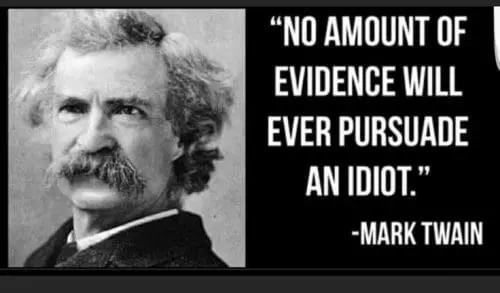A poor, uneducated white boy from Missouri runs away from his drunken father and hops on a raft to head down the Mississippi River with a runaway slave. It is a story that most Americans know. It is Mark Twain’s classic American novel “The Adventures of Huckleberry Finn,” and until recently, it was a staple in most American high school english classes.
But Alan Gribben, a Mark Twain scholar, co-founder of the Mark Twain Circle of America, and the editor of the Mark Twain Journal, fears we may be in danger of losing this American novel due to its use of the N-word about 215 times. On Oct. 22 he gave a lecture titled “Twenty-First Century Censorship of Mark Twain,” in which he discussed the issue and explained why he published a new edition of Huckleberry Finn which replaces the N-word with “slave.”
Gribben got his doctorate at the University of California, Berkeley and spent most of his career teaching English and trying to put together Mark Twain’s library which was scattered after his death.
But in 2011 Gribben took a detour from his normal work after years of noticing that Twain’s use of the N-word in Huckleberry Finn was an increasing problem.
In 1985, Gribben attended an academic conference largely focused on Huckleberry Finn. Outside the conference African Americans were picketing the conference for celebrating a novel full of the offensive word.
“And that gave me the real sense that we were into something rather volatile,” Gribben said.
Twain wrote Huckleberry Finn in 1885 and by the beginning of the 19th century, many scholars accepted it as a brilliant work of American literature. By the 1950’s most high schools had it in their curriculum.
Later, with the integration of schools and the civil rights movement, the use of the N-word in Twain’s novel became contentious in the broader context of racial tensions and the word’s vile connotation.
Over his years teaching at universities, Gribben himself noticed when he taught Huckleberry Finn a significant portion of the African American students in the class didn’t object to reading it, but often skipped class during the days they discussed the book.
Soon, Gribben began hearing from high school teachers who they felt they simply could not teach Huckleberry Finn anymore because the use of the N-word was too difficult an obstacle to overcome. Some school boards began slipping it out of the curriculum.
Even fellow university colleagues told Gribben they were no longer teaching the book.
“It wasn’t that they didn’t have the courage to teach it, it just took too long to explain the etymology of the N-word, and how Twain was dedicated to the realist movement, and thereby he felt he had to accurately display the language of uneducated boys and adults in the 1830s,” Gribben said.
Worried that one of the most influential figures of the 19th century and American literature might be slipping away, a thought struck Gribben.
“It suddenly occurred to me, ‘What if I took the offending word out?’ It is a vile word. It is probably the worst slur in the English language at this moment anyway,” Gribben said.
Gribben approached NewSouth books, asking if they would be interested in publishing an edition of the book that changed nothing else except substituting “slave” for the N-word. NewSouth Books said they would publish it, even though Gribben warned them it might cause some serious backlash.
“This went against everything I had been taught at the University of California, Berkeley,” Gribben said. “I knew that I would offend the textual purists, but what if I made it possible for school boards to get past this thing?”
The media went berserk before the new edition was even published. Common headlines were “Southern prof. thinks he can write better than Twain” or “Southern prof. wrecks Twain’s masterpiece.” There were demands that Gribben’s chair fire him.
“It was castigated by my fellow Twain colleagues, so much so that at the next conference I went to I was cold-shouldered by just about everybody there, except long-time close friends,” Gribben said. “I had clearly hurt my brand and my longtime Mark Twain scholarship by doing this thing.”
The book began to gain sales, however, and when Gribben offered the option of reading the original or the edited edition of Huckleberry Finn in his classes, many students chose to read the edited version. One African American cashier at Panera Bread recognized his name when Gribben paid and hugged him, thanking him for his work and for making it possible for her to give the book to her daughter.
Gribben’s wife, Irene, the managing editor of the Mark Twain Journal, added that he was not censoring but fighting de facto censorship.
“They are censoring by not putting it in classrooms,” Wong said.
Gribben was afraid Twain’s novel, and especially the deeper message in it, would be lost to our culture.
Twain’s novel is not just about how a white boy comes to see that a black slave is a human. In Twain’s own words it is about what happens when “a sound heart and a deformed conscience come into collision, and conscience suffers a defeat.”
And Gribben said that though he changed the word, he does not think it defeats the novel’s purpose, nor lessens its power.
“Things like this are very fragile in culture and its very easy to lose them. I think we are on the verge here of losing Mark Twain if people don’t become aware of this peril,” Gribben said.
Senior Maria Forsythe who attended Gribben’s lecture said she thinks many schools in the U.S. may decide to take certain offensive books out their curriculum, but she believes it’s important to teach students how to read books like that.
“Even if we don’t like certain aspects of the story, we still must respect the fact that the author had a message that he wants readers to grasp,” Forsythe said.
But after all the controversy he has faced, Gribben said he just hopes he has helped keep Twain in our culture because it is a good story with an important message.
“I hope I’ll be remembered, if I am remembered at all, for my research into Mark Twain’s reading, which has been the labor of my life,” Gribben said. “But I took that little detour.”





